Feb 5, 2025
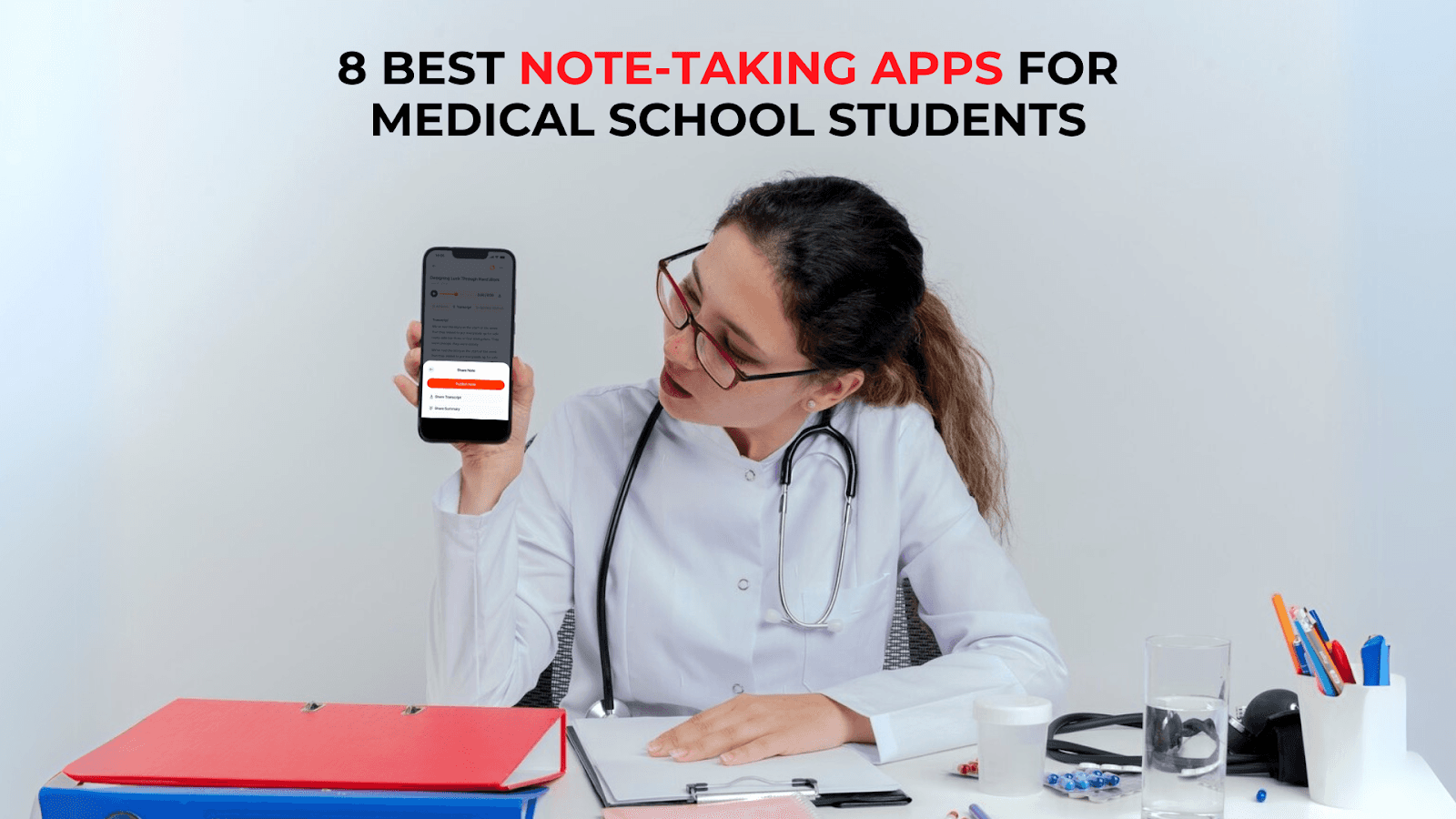
Medical school can be incredibly demanding. The sheer volume of information you need to process daily is overwhelming. Lectures, textbooks, research articles, and clinical notes—how do you keep it all straight? Traditional pen-and-paper notes simply can’t keep up with the complexity and volume of material. They can be hard to organize, difficult to search through, and nearly impossible to share or collaborate with others.
This is where digital note-taking apps step in. They solve these challenges by organizing and syncing your notes across devices, making learning more efficient.
So, let us explore the eight best note-taking apps for medical school students in this blog. We'll explore the features of each app that help organize medical knowledge, boost study efficiency, and simplify workflow.
Key Features to Look for in a Note-Taking App
When choosing a note-taking app, it's important to consider features that enhance productivity and organization. Here are key features to look for in a note-taking app:
1. User-Friendly Design
When selecting a note-taking app, prioritize usability. The interface should be intuitive, allowing you to dive in without a steep learning curve. An easy-to-navigate design ensures that you spend more time studying and less time figuring out how the app works.
2. Rich Text Features
The ability to use rich text features is essential for organizing complex medical content. Look for tools that support formatting options such as bold, italics, headings, bullet points, and checklists. These features help you create visually structured and easy-to-follow notes, especially when dealing with intricate topics like anatomy or pharmacology.
3. Organizing Notes
Effective note organization is the key to efficient study. A good app should allow you to arrange notes into folders and subfolders, offering a clear hierarchy. This structure helps you compartmentalize different subjects or topics, making retrieval easier.
4. Tagging for Easy Retrieval
Tagging is another valuable organizational tool. With tags like #cardiology or #pathology, you can group related notes and easily pull up all relevant information with a single click. This is especially helpful during revision or while preparing for exams.
5. Search Functionality
A strong search function is indispensable in a note-taking app. It allows you to quickly locate specific notes, keywords, or even phrases without wasting time scrolling through your entire library. This is particularly useful for on-the-spot learning or when you need to review a specific concept.
6. Cross-Device Syncing
Medical students often switch between devices—laptops for study, tablets for note review, and phones for quick access. Ensure the app you choose syncs seamlessly across all your devices so your notes are always current and accessible. Cloud synchronization is a critical feature here.
7. Support for Multiple Inputs
A versatile app should support diverse input methods, such as typing, handwritten notes (via stylus), and even voice recordings. The ability to upload lecture recordings or dictate notes on the go ensures you never miss out on important details during fast-paced lectures or busy days.
8. Note-Taking from YouTube Videos
Many medical students rely on YouTube to learn complex topics. Choose an app that not only lets you take notes directly from YouTube videos but also offers features like auto-generated transcripts and summaries. This feature helps you quickly capture key points, understand complex concepts, and create concise study material.
9. Integration with Other Software
Apps that integrate with tools like Microsoft Office, Google Drive, or reference management software enhance flexibility. Such integrations make it easy to link notes with presentations, assignments, or other study materials.
10. Voice Recording and Upload
For busy students, voice recording capabilities are invaluable. Whether it’s capturing key points from lectures or recording your thoughts on the go, this feature ensures no information slips through the cracks. Some apps even let you attach recordings to specific notes for added context.
11. Collaboration Features
Collaboration is key, especially for group study sessions or projects. Apps with features that allow you to share notes, comment on shared content, or co-edit documents can enhance teamwork and collective learning.
Choosing the right note-taking app means carefully evaluating these features. The ideal app should make studying easier and align seamlessly with your workflow as a medical student.
Now, let’s dive into eight popular note-taking apps that can enhance your learning experience and help you stay organized.
8 Popular Note-Taking Apps for Medical Students
Finding the right note-taking app for medical students can make studying more efficient and organized. Here are eight popular note-taking apps that cater specifically to their needs:
1. Audionotes
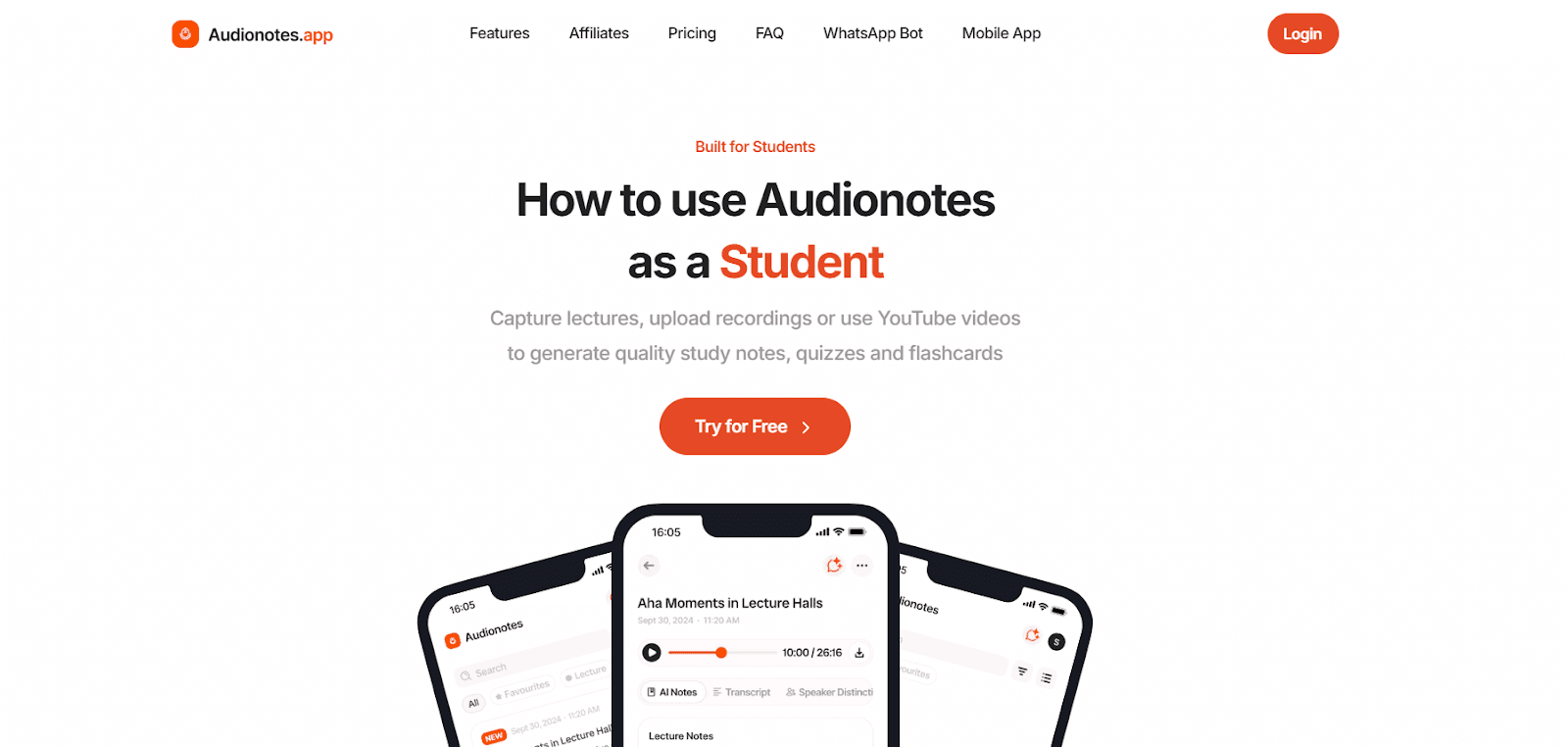
Audionotes is an innovative AI-powered note-taking app that captures audio, text, and even YouTube videos to transform them into structured, actionable notes. It is especially helpful for medical students who need to take notes during lectures, meetings, or while reviewing educational videos. Audionotes uses advanced AI to transcribe, summarize, and organize the content in a highly organized and accessible way. It can generate notes in over 30 languages and translate outputs for broader accessibility. Audionotes is available on Web, iOS, and Android.
Key Features
Multi-Input Support: Capture voice recordings, upload files, extract notes from YouTube videos, images, and text.
Mind Map Generation: Automatically generate mind maps to visualize complex medical topics, helping you organize information effectively for easier recall.
Custom ChatGPT Prompts: Personalize your note-taking experience with your own ChatGPT prompts for tailored summaries.
Tagging & Organization: Tag notes and organize them in folders for easy retrieval and streamlined workflows.
Note Filtering: Filter notes by tags, keywords, or dates to quickly find the most relevant content.
Interactive Chat: Engage in direct conversations with all your notes or specific ones for deeper exploration.
Integration Support: Sync your notes with Notion for a seamless study experience across platforms.
Pros
An intuitive design that makes capturing and organizing notes quick and hassle-free.
Time-saving automation for transcription and note organization, reducing manual effort.
Cons
Limited availability of advanced features for free users.
Free trial available
Personal: $69.99/year
Pro: $129.99/year
2. Microsoft OneNote
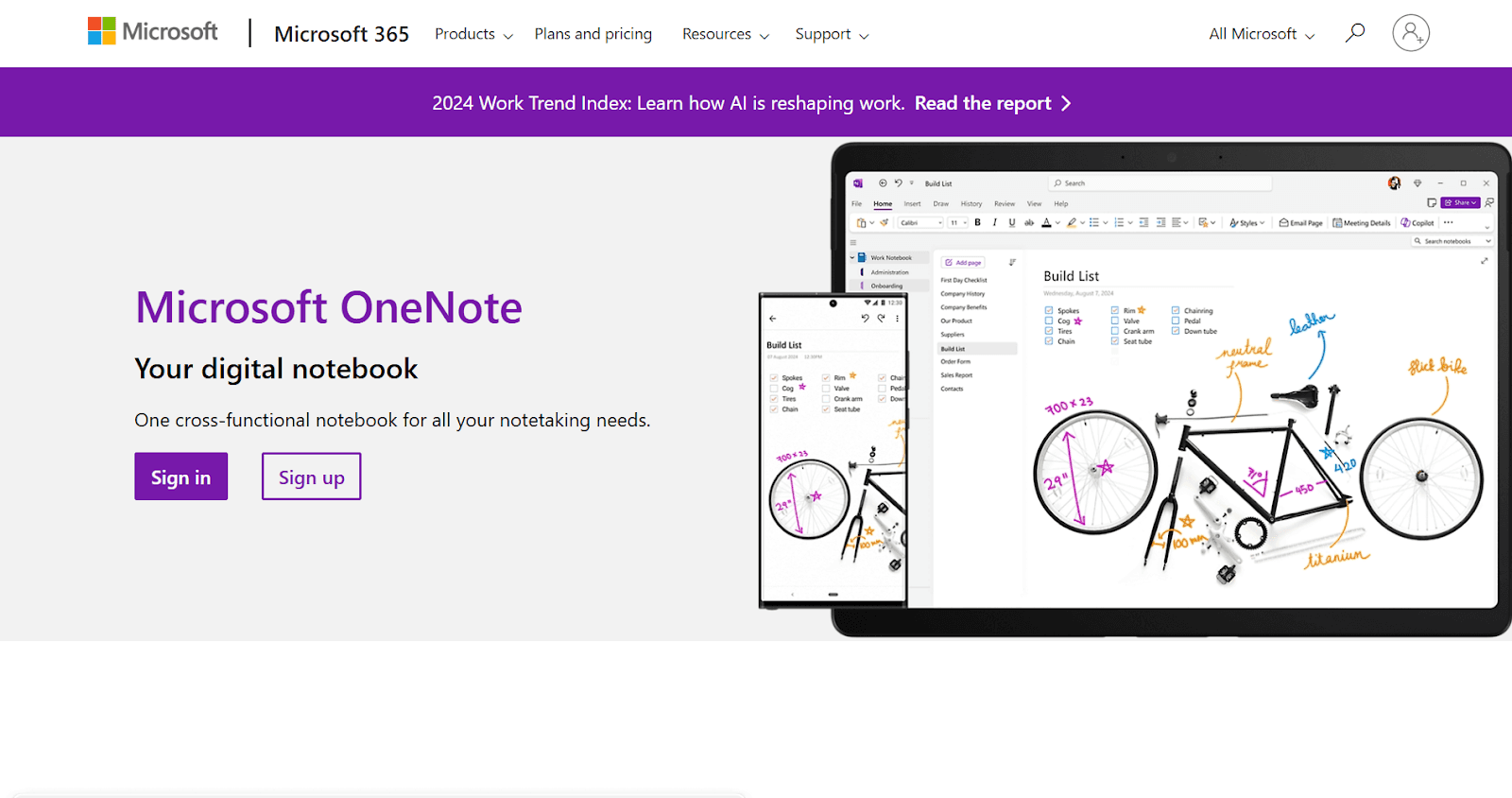
OneNote is a cross-platform note-taking app that integrates perfectly with Microsoft Office. It’s an excellent choice for students already using Microsoft 365 tools like Word, Excel, and PowerPoint. OneNote offers real-time collaboration, making sharing notes and working with study groups easy. It's seamless syncing across devices also ensures you can access your notes anywhere, anytime.
Key Features
Web Clipping: Capture content from web pages directly into your notes for research purposes.
Text Extraction from Images: Automatically extracts text from images, making scanned content searchable.
Customizable Notebooks: Organize your notes into notebooks, sections, and pages for easy navigation.
Audio Recording: Record lectures or meetings directly within the app and link them to specific notes.
Searchable Tags: Add and search tags to easily categorize and find notes based on keywords.
Pros
Free and accessible on all devices.
Integrates seamlessly with other Microsoft apps.
Cons
Limited organizational features.
It can be slow with large notebooks.
Pricing:
Microsoft 365 Family: $12.99/month
Microsoft 365 Personal: $9.99/month
3. Evernote
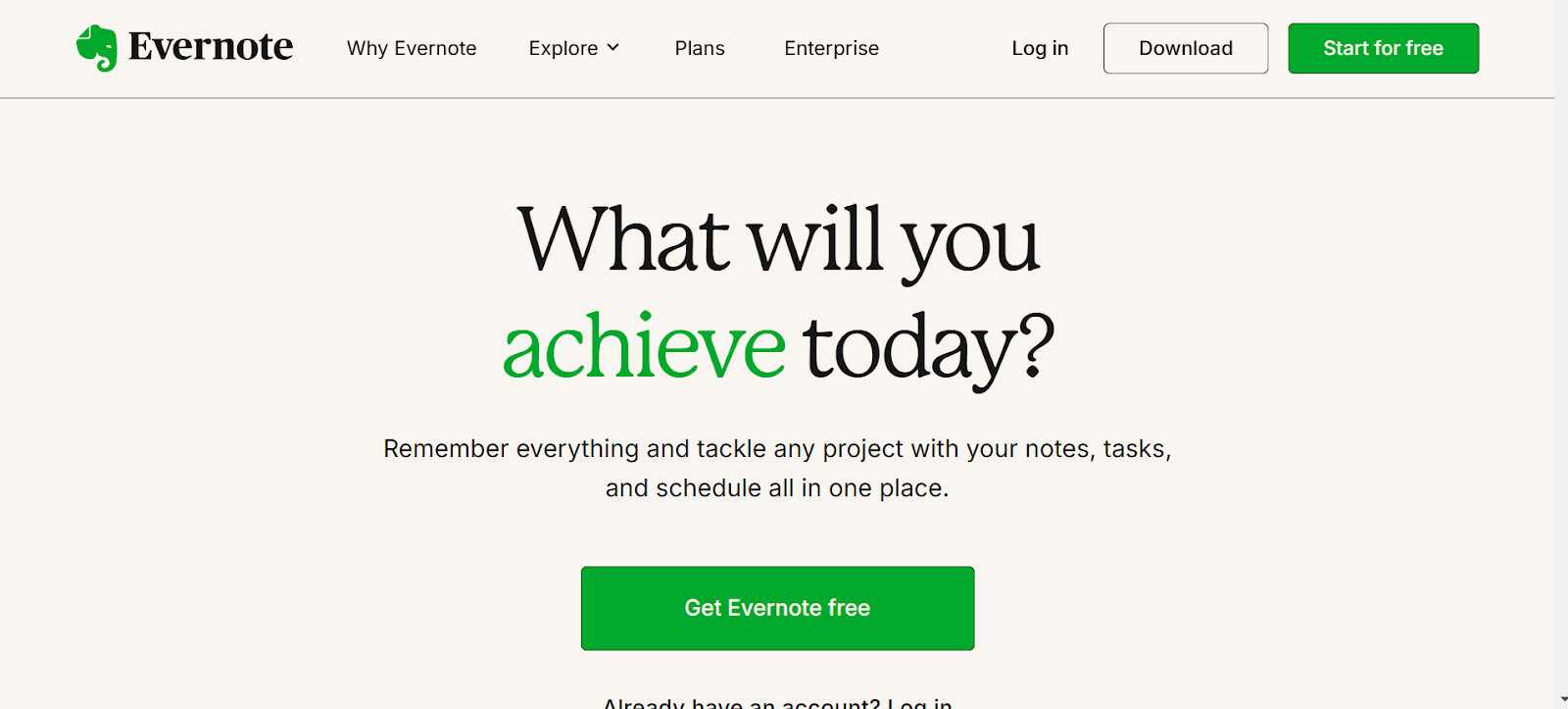
Evernote is a versatile note-taking app that empowers students to stay organized and productive. With its strong multimedia support, you can store and organize everything from lecture notes to research articles, ensuring your study materials are always in one place. Its powerful search capabilities and task management tools help structure your academic life.
Key Features
Document Scanning: Capture physical documents with Evernote's scanner and convert them into searchable PDFs.
Task Management: Create to-do lists and reminders within notes to stay organized with tasks and deadlines.
Note Linking: Link related notes together to cross-reference and connect different medical topics.
Cross-Device Sync: Sync your notes effortlessly across multiple devices, ensuring access wherever you are.
Presentation Mode: Use Evernote’s presentation mode to show your notes as slides during study sessions or meetings.
Pros
Excellent for research with web clipping and multimedia support.
Powerful search and tagging system.
Cons
Limited organizational structure, especially for large projects.
It has an expensive premium version.
Pricing:
Personal: $14.99/month
Professional: $17.99/month
4. Notion
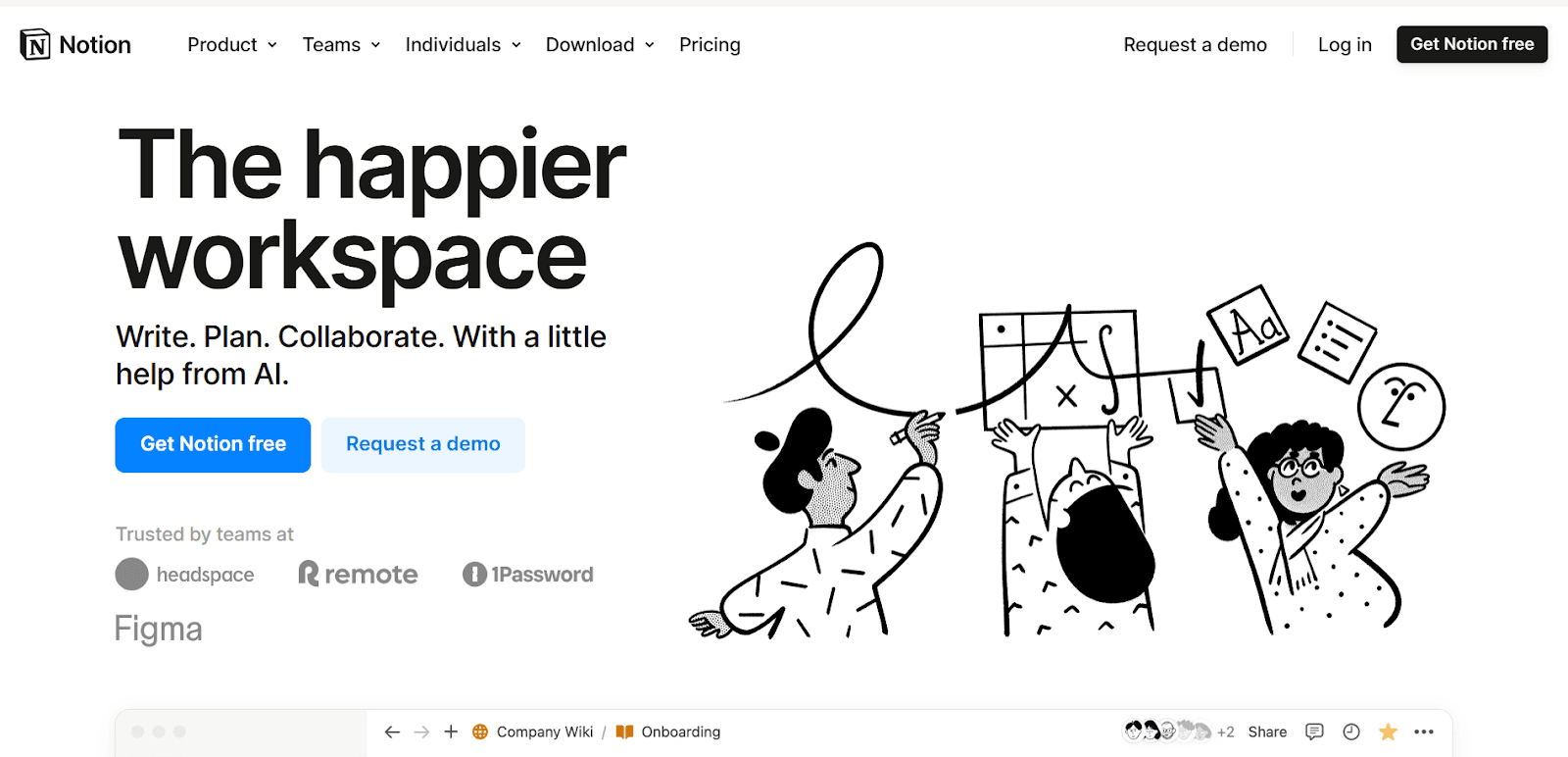
Notion is a powerful, flexible app designed for customization. It is ideal for students who want to organize their medical notes and tasks in a highly personalized way. Notion works as a combination of a note-taking app and a project management tool. It offers a sleek interface that brings creativity while maintaining high functionality. It allows medical students to seamlessly blend their personal and academic workflows, keeping everything in one organized space without feeling cluttered.
Key Features
Database-Driven Organization: Organize notes, tasks, and projects using a database structure for easy reference.
Custom Templates: Create personalized templates for specific study needs, like lecture notes or project planning.
Collaboration: Share pages and collaborate easily with classmates or study groups on projects and notes.
Calendar Integration: Schedule your tasks and exams directly within Notion, with automatic date reminders.
Nested Pages: Create an organized hierarchy of nested pages to break down complex topics into smaller, manageable sections.
Linking Between Pages: Easily link related notes, lectures, or projects for quick navigation between topics.
Pros
Highly customizable with a clean, clear hierarchy.
Great for both individual and group work.
Cons
Steep learning curve.
Requires an internet connection for full functionality.
Pricing:
Free Plan
Plus: $10/month
Business: $15/month
Enterprise: Custom Plan (Contact Sales)
5. Bear
Bear is a minimalist note-taking app designed specifically for Apple users. Its simple interface supports advanced markdown features, making it ideal for those who prefer a distraction-free writing environment. The clean design allows you to focus solely on the content, while its organization tools help keep your notes neat and easy to navigate. Bear is the perfect choice for Apple users seeking a streamlined, efficient way to capture and organize their thoughts.
Key Features
Focus Mode: A distraction-free writing environment that hides toolbars and other elements to enhance focus.
Linking Notes: Easily create relationships between notes by adding internal links and streamlining navigation.
Custom Themes: Personalize the app’s interface with custom themes to suit your visual preferences.
Encrypted Notes: Secure your sensitive notes with a password, offering an additional layer of privacy.
Cross-Device Sync: Sync your notes across all Apple devices, ensuring easy access and organization on your iPhone, iPad, and Mac.
Pros
Simple, clean design with excellent markdown support.
An affordable premium version.
Cons
Only available on iOS and Mac devices.
Syncing requires a premium account.
Pricing:
Free Plan
Pro: $2.99/month
6. Apple Notes
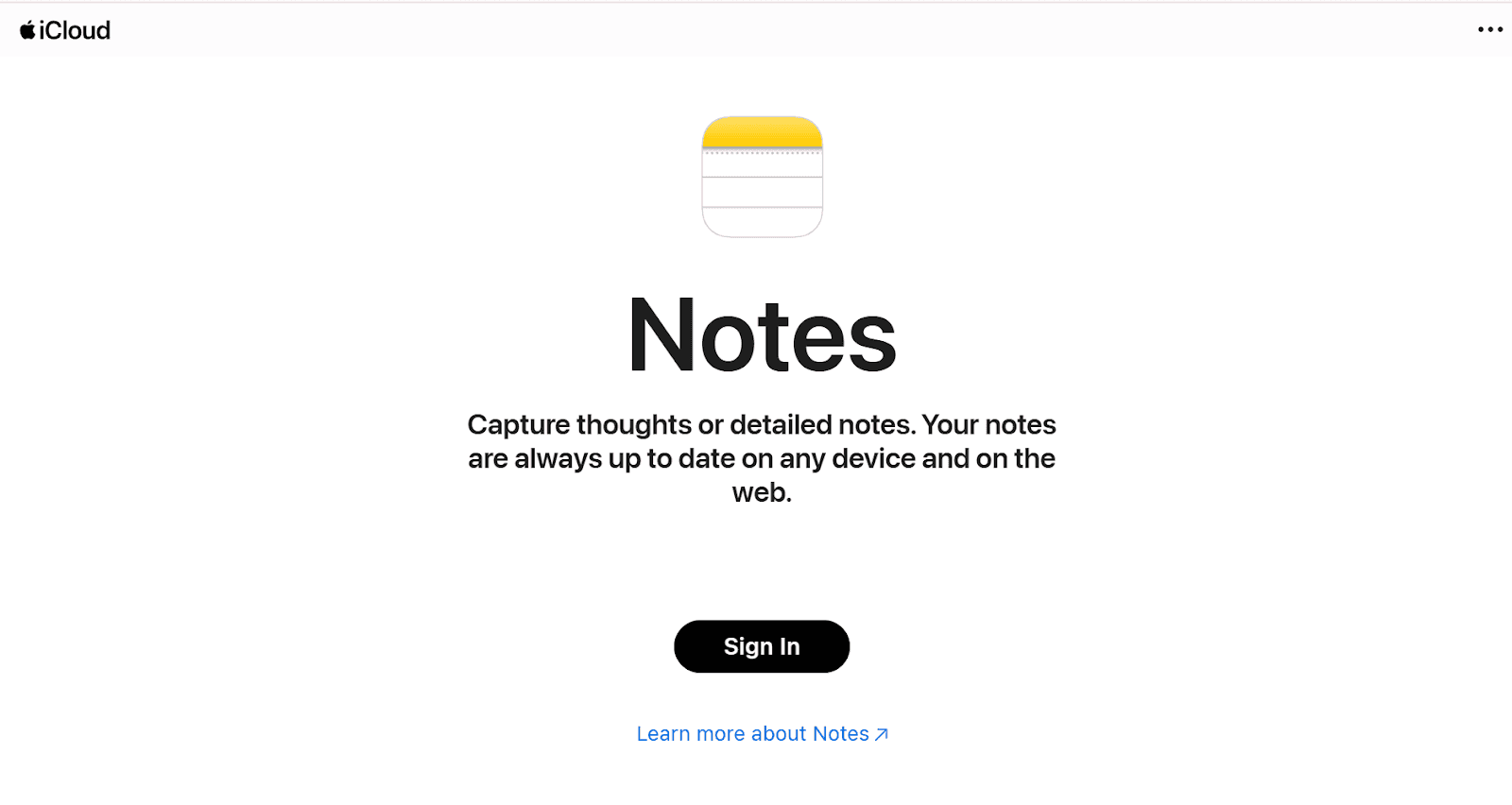
Apple Notes is a highly intuitive and versatile note-taking app, perfect for anyone within the Apple ecosystem. Its seamless syncing between all Apple devices allows for effortless access and editing, whether you’re on an iPhone, iPad, or Mac. Its built-in organizational tools offer a simple yet effective solution for storing and managing your notes without the complexity of other apps.
Key Features
Basic Text Formatting: Add headings, bullet points, checklists, and images to your notes for clear structure.
Drawing & Annotation: Insert sketches, diagrams, and handwritten notes for more dynamic study material.
Collaboration: Share notes with classmates for easy collaboration, allowing real-time editing and feedback.
No Premium Version: Free to use with no paid version or hidden features, making it accessible to all users.
Pros
Free and simple to use.
Seamless integration across Apple devices.
Cons
It lacks advanced features, making it less suitable for complex tasks.
The formatting tools are limited.
Not available on non-Apple devices.
Pricing: Free
7. SimpleNote
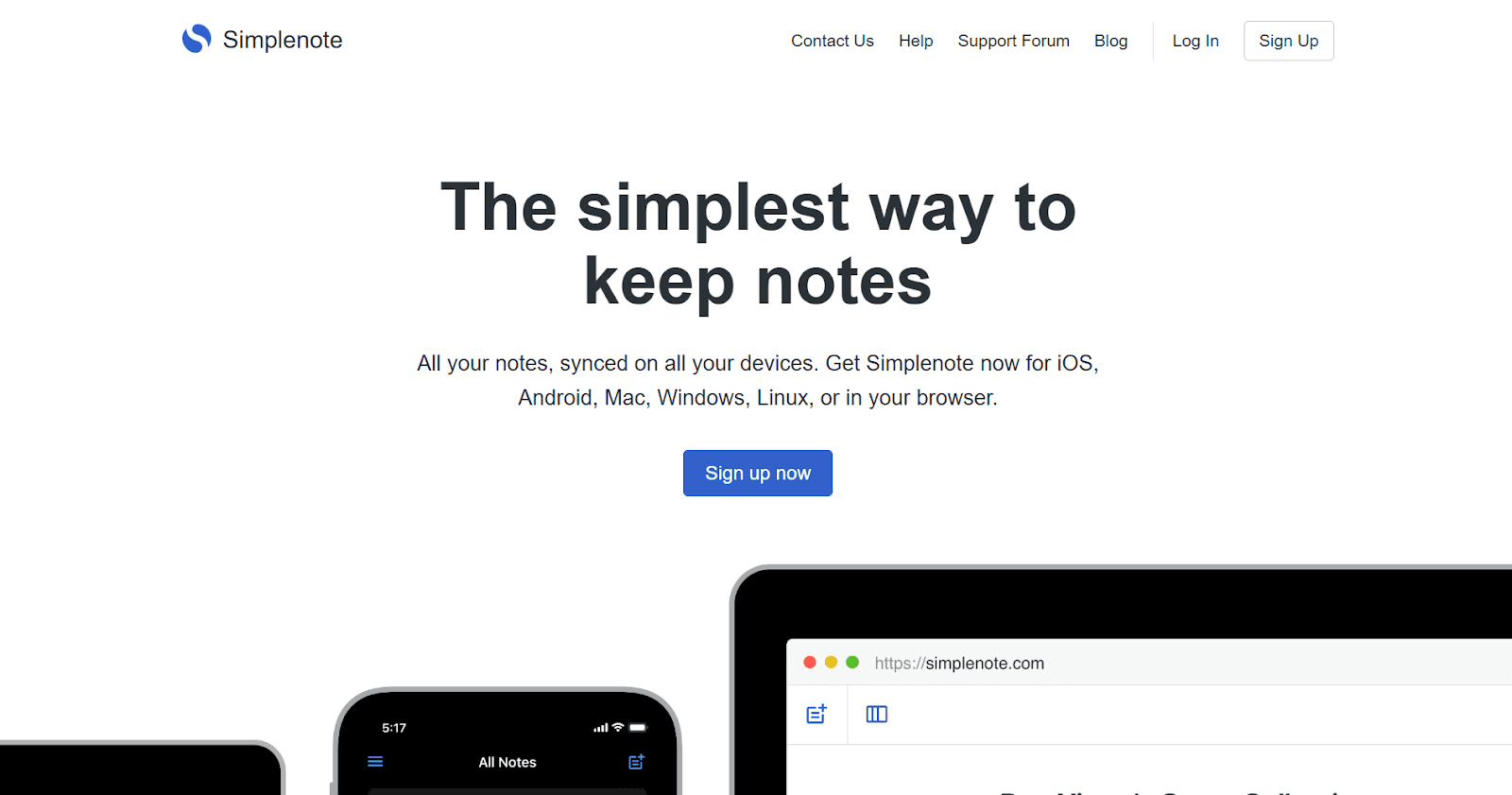
Simplenote is a free and minimalist note-taking app tailored for students who prioritize clarity and focus. Its straightforward design eliminates distractions, allowing you to concentrate on capturing and managing your thoughts with ease. Whether you're jotting down quick ideas or organizing detailed study material, Simplenote provides a reliable platform for seamless productivity. Lightweight and responsive, it’s perfect for students seeking an efficient and no-fuss way to keep their notes organized and accessible anytime.
Key Features
Effortless Note Sharing: Share notes with others via email or direct links for easy collaboration.
Real-Time Sync: Changes made to notes are instantly reflected across all connected devices, ensuring up-to-date access.
Markdown Support: Simplify note-taking with Markdown, offering clean, well-structured notes using basic text formatting.
Quick Note Search: Search through your notes instantly using keywords or tags to find what you need faster.
Version History: Keep track of previous note versions and access older versions as needed for reference.
Pros
Free to use, no paid version
Simplenote quickly loads and doesn’t slow down your device, even with large note collections.
Cons
Lacks advanced features like rich text or multimedia.
No hierarchy for organizing notes.
Pricing: Free
8. Anki
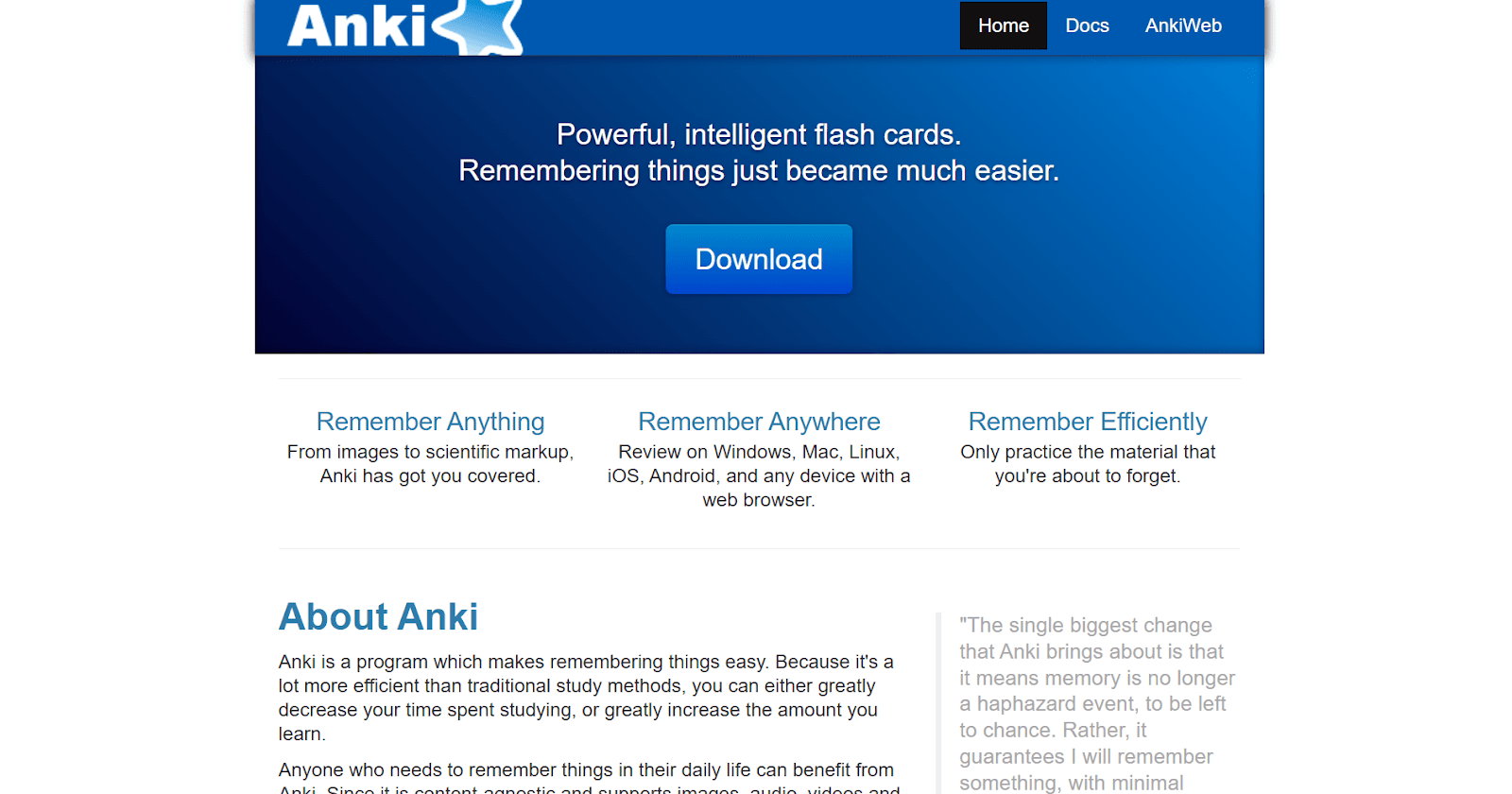
Anki is a flashcard-based tool for medical students who need to retain large amounts of information efficiently. Using spaced repetition, Anki helps you retain key concepts over the long term, making it ideal for mastering subjects with heavy memorization requirements. Its flexibility and support for multimedia also enhance the learning experience, allowing students to tailor their study material to their specific needs. It’s ideal for learning medical terminology, drug names, and anatomical structures.
Key Features
Spaced Repetition Algorithm: Optimize your review intervals based on your learning progress to enhance memorization efficiency and ensure long-term retention.
Customizable Flashcards: Create flashcards with text, images, audio, or video tailored to your learning needs.
Large Pre-Made Decks: Access thousands of shared flashcard decks created by fellow medical students.
Progress Tracking: Track your study progress and see detailed statistics on your learning performance over time.
Collaborative Learning: Share flashcard decks with study groups or classmates to enhance collaborative learning and reinforce key concepts.
Pros
Highly effective for memorization and long-term retention.
Free and accessible to all
Cons
Steep learning curve for beginners.
Initial setup can be time-consuming.
Lack of a modern, visually appealing design compared to newer apps.
Pricing:
Free for web and Windows
iOS Mobile App: $24.99/One-time purchase
Finding the right note-taking app can transform how you manage and retain complex medical information. These eight apps offer unique features to support your study goals and streamline your workflow.
Effective Note-Taking Methods for Medical Students
In addition to choosing the best note-taking app, it's crucial to adopt effective strategies to make the most of your notes. Here are some proven methods that can enhance your learning experience in medical school:
The Cornell Method: Divide your page into three sections—notes, key points/questions, and a summary. Use this method to organize information efficiently and make your review process easier.
Mind Mapping: Draw visual mind maps to link concepts, especially for subjects like microbiology, where understanding connections between bacteria and diseases is crucial.
Outlining: Structure your notes with bullet points and headings to clearly organize information and quickly locate related topics.
The Charting Method: Create tables to organize comparative data, which is especially helpful for subjects like pharmacology or pathology when comparing treatments or symptoms.
Highlight Text in Different Colors: Use color-coding to differentiate concepts and categories. For example, assign specific colors for definitions, mechanisms, or treatments to enhance recall and organization.
These methods can be easily integrated into your digital notes, making them even more powerful and organized for efficient studying.
Conclusion
Choosing the right note-taking app can truly transform your study routine. While each app has unique features, the best one for you is the one that makes note-making seamless, enhancing your productivity. For medical students looking for something beyond traditional note-taking, Audionotes offers an innovative solution.
With its AI-powered transcription, summarization, and organization features, it turns your lectures and study sessions into structured, actionable insights. Audionotes also offers mind map generation, personalized ChatGPT prompts, and effortless integration with tools like Notion and Zapier, enhancing your study experience.
Want to make studying smarter and more efficient? Get started with Audionotes on iOS, Android, or the Web. Your notes, your way—anytime, anywhere.
